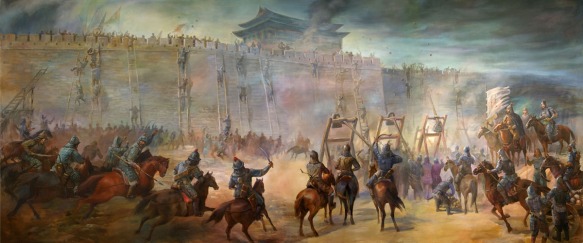Mongol army storming a Chinese city. The achievements of Genghis Khan remained a popular subject for stories and illustrations throughout the Turco-Persian world and the Mogul emperors of India looked to Genghis Khan as their great forebear.
At the Battle of Huan’erzui (Badger’s Mouth) in February 1212, the Mongols under CHINGGIS KHAN delivered a legendary defeat to the field armies of the Jin dynasty in North China.
Although the Mongols had advanced as far as the capital of North China’s JIN DYNASTY in 1211, they withdrew to the Jin frontier in Inner Mongolia that winter. In February 1212 the Mongols took the border prefecture of Huanzhou (near modern Zhenglan Qi) and besieged Fuzhou. The Jin emperor dispatched the bandit-suppression commissioner, Heshilie Jiujin, to lead the crack cavalry of the ruling Jurchen people and KITANS, assisted by Han (ethnic Chinese) infantry under two civil officials, Duji Qianjianu and Hu Sha. The force totaled several hundred thousand.
Leaving Hu Sha with infantry at Huihebao Fort (modern Huai’an), Heshilie Jiujin and Duji Qianjianu advanced past Yehuling (Fox Range) into Inner Mongolia. While certain Kitan commanders advocated a surprise attack, Heshilie Jiujin preferred to advance his troops in a body and sent an envoy to Chinggis Khan denouncing his invasion. The Mongols besieging Fuzhou (in Inner Mongolia) had been eating breakfast but formed up quickly after hearing of the Jin advance. Although the Mongols were vastly outnumbered, MUQALI, Chinggis Khan’s trusted NÖKÖR (companion), led a cavalry charge, discomfiting the Jin ranks. The main Mongol force then moved up to shatter the Jin troops. Pursuing the fugitives more than 48 kilometers (30 miles) they met Hu Sha’s rear guard at Huihebao Fort, crushing it. The flower of Jin soldiery was destroyed in this battle, which became legendary among the Mongols. The victory was attributed to the fighting qualities of the Mongol cavalry, Heshilie Jiujin’s excessive caution and reliance on numbers, and the disaffection of many Kitan commanders, who resented Jurchen control.
